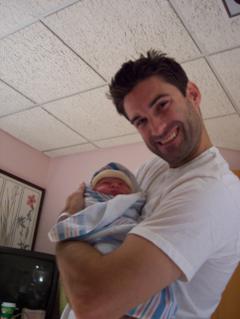Owen is now one week old. I’ve never been one to keep up with anniversaries, certainly not one week dates. However, love has a way of etching events into your heart and mind. I also didn’t know it was possible to fall in love twice, but Owen and Robie are the center of my affection. Of course, the kind of love I have for my son differs from my love for my wife, but it is love nonetheless.
Like all other loves, fatherly love is tested, even from infancy. Surprisingly, the screaming, pooping and general lack of reciprocity aren’t what test my love for Owen. Of the three, I think his crying is the most painful. Partly because I don’t want him to be sad, uncomfortable, etc. and partly because I lack patience. In reflection upon my poverty of patience I’ve realized my warped perspective on what patience really is.
Although I would have never told you that patience is a remedial attribute, I have believed so. Somehow (in my selfishness), I’ve thought and acted as if patience is a product of welfare. Its something I give to things and people because they require it. When confronted with a trying circumstance, I descend the hill of my superior level of life and satisfaction in order to accommodate the needs of less fortunate souls. In short, when I’m patient people benefit- a pretty arrogant view of patience.
This all came to a head when I was putting together an automatic swing for Owen that I didn’t want to keep. We’ve already accumulated too much baby stuff…I was thinking (and I know, we’ll be offered much more). Frustrated that I couldn’t do what I wanted to do, I tackled the swing assembly with irritation. This irritation, which I was doing a poor job of fighting off, quickly turned to silent anger as I corrected mistakes made it the assembly process. Dissatisfaction, discontent and negative vibes radiated outwards, rocking the ones I love. After being confronted lovingly by my wife, I repented and apologized to my mother-in-law. You can hurt people without even touching or speaking. Now that I think of it, I need to go apologize to Owen too. If there is one thing I’ve learned in being a husband, its to be a “lead repenter,” even if you feel like others are also in the wrong.
The next morning, the Spirit moved me gently from my current source of meditation, Colossians, to Ecclesiastes via Galatians. The subject of meditation and learning was plain- patience. Reminding me that patience is not so much a virtue as it is a fruit of the Spirit, the Lord called to mind Galatians 5. Patience is not remedial; its Spirit-ual. Its on par with love, joy, and peace and is a product of keeping in step with the Spirit. The only welfare with patience is divine welfare, something I’m in infinite need of.
Then came Ecc 7.8: “Better is the end of a thing than its beginning, and the patient in spirit is better than the proud in spirit.” Why was I impatient with the inanimate swing? Because haughty me had better things to do! Why was the end of the swing assembly not better than the beginning? Because I didn’t chose the better way. Oh for the greater satisfaction of a patient spirit, whose patience is of the Spirit!
Praying for true patience.


